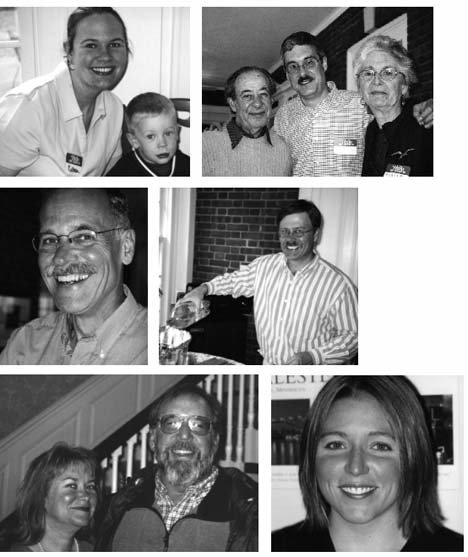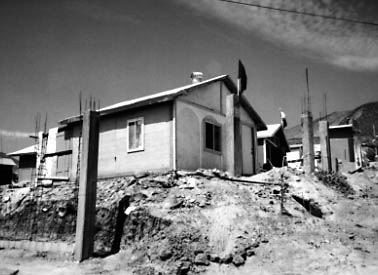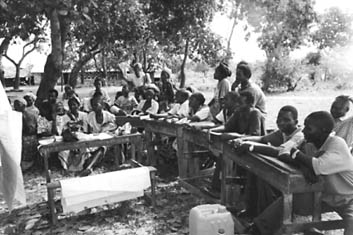
Volume 11, No. 1 Archives
Table Of Contents
Cottonwood awards $44,000 in grants in fall 2004
Celebrating over $1/4 million in grants
What is Cottonwood Foundation?
Give your support to Cottonwood Foundation!
In their own words
Cottonwood awards $44,000 in grants in fall 2004
Thanks to your
support, this fall Cottonwood Foundation has awarded 22 grants of $1,000
each to grassroots organizations worldwide that are working for a sustainable
future.
This brings the total grants awarded in 2004 by Cottonwood Foundation
to $44,000, a new record! Cottonwood Foundation’s board has worked
hard to select projects suggested by Cottonwood Partner organizations
for which your contributions will make a significant difference.
Following is a listing of the 22 grants awarded this fall: (Please note
that organizations followed by “USA/[another country]” are
based in the United States, but were funded for a specific project in
another country.)
- African Blackwood Conservation Project, USA/Tanzania
- to complete a basic building at the Moshi Mpingo tree nursery, which
provides secure storage for gardening tools as well as shelter and overnight
accommodations for volunteers and nursery staff.
- Agribusiness in Sustainable Natural African Plant Products
(ASNAPP), Ghana - to construct a basic packing house for use
by farmers in Aklamador for selecting, sorting and packing of a traditional
herbal tea which they have grown.
- Association "Green Alternative" Republic
of Georgia - to purchase 340 new textbooks benefiting all nine grades
of the Akhaldaba Boarding School serving 200 children, as well as environmental
education training for teachers and planting of trees by students.
- Blue Veins, Pakistan - to provide clean drinking
water to the people of Arando Khawar village through installation of
two hand pumps, so that the villagers will no longer need travel 14
kilometers for clean water or to use sewage-contaminated canal water.
- Center for People's Agricultural Plan for the 21st Century,
Philippines - to assist 10 agrarian reform beneficiary farm families
to pursue diversified organic farming, including purchase of farm tools
and materials, seeds, two carabao (water buffalo), and skills training.
- Centre for Indian Knowledge Systems, India - to support
the growing of green manure crops for income generation by small farmers
in Kanchipuram District, Tamil Nadu, including providing seeds, organic
inputs like neem cake and biofertilizers, and training.
- Centro de Educacion Creativa, Costa Rica - to construct
a vermiculture composting house at this environmentally focused school
that will produce rich compost for organic vegetable gardens, native
plant gardens, and local reforestation activities.
- Common Ground Program, Kenya - to support the students
and staff at Pathfinder Academy in providing biointensive agriculture
training to 30 widows and their families in Bafubi Women Group, including
tools, starter seeds, and educational materials.
- Dos Pueblos: New York-Tipitapa Sister City Project,
USA/Nicaragua - for pipes and tubes to be used by local volunteer labor
to extend potable water to the community of Miraluz, which will serve
35 families without local access to water.
- Eco-Garden, Kenya - for training small farmers in
organic gardening and sustainable environmental management, as well
as providing them with tools, vegetable and tree seeds, and to help
maintain Eco-Garden's six bicycles.
- Fundacion Ecologica Tercer Mundo, Ecuador - to construct
in Nalpe a small laundry house, water filtration system, settling ponds,
and water transport system, using mostly community volunteer labor,
to help protect the water quality of the Rio Vite.
- Health Education Adoption Rehabilitation Development Society,
India - for a community water program for the 42 tribal families of
Lakshmipuram Village including drilling a 300 feet bore well, purchasing
a casing pipe, and purchase of hand pumps.
- Interaccion para el Desarrollo Sostenible, Bolivia
- for reforestation programs in rural communities, printing of educational
materials, purchase of agroforestry and agricultural crop seeds, holding
training courses, and transportation for volunteers.
- Jeevan Rekha Parishad, India - for training and assisting
women in beekeeping and honey processing in Chandaka village, Orissa,
including providing two bee boxes to each of 20 members of a self-help
group and purchase of a honey processing unit.
- Nabichakha Women Group, Kenya - to purchase seeds,
bags, and organic materials to grow 2,000 saplings of indigenous, herbal,
and fruit trees that will help reforest and rehabilitate badly degraded
land and provide income and food.
- Nepal Social Service Fund, USA/Nepal - to support
a Safe House and community education center in Kathmandu, which serves
surgical patients and their families as well as street children, including
the purchase of a kerosene refrigerator and kerosene stove.
- New Forests Project, USA/Honduras & El Salvador
- to purchase 10 chlorine disinfecting devices for drinking water and
to train plumbers in water disinfection in 10 small communities in rural
Honduras and El Salvador.
- Outreach Asia, USA/Laos - to fund a new, larger and
greatly improved classroom with a cement floor, new desks, and toilet
at a rural elementary school in Hoey Yen Village which will have sufficient
space for all of the village children who wish to learn.
- PermaLot, Czech Republic - for purchase of a photovoltaic
panel and radio-controlled steering for a prototype pollution-free,
solarpowered agricultural vehicle that can transport water, pallets,
agricultural workers, and harvested produce.
- Porters' Progress, USA/Nepal - to run for an entire
year free daily education and empowerment programs in Lukla which reach
at least 1,000 child and adult Nepali porters, including purchase of
classroom materials and teaching aids.
- Red Cliff Land Recovery Project, USA - to support
land acquisition by a Native American tribal organization on the Red
Cliff Reservation in northern Wisconsin.
- Trees for the Future, USA/Senegal - to support production of two training videos, in both Wolof and English versions, that will help farmers in Senegal and elsewhere learn the benefits of incorporating agroforestry techniques into their gardens and crop fields.
Celebrating over $1/4 million in grants
On Sunday,
May 23, 2004, Cottonwood Foundation’s donors, volunteers and partners
were invited to a special open house at Macalester College in St. Paul
to celebrate the foundation’s awarding over $250,000 in grants
since 1992. Below are a few pictures taken at the event, which was attended
by 36 individuals. Special thanks to Craig Miller, Cottonwood Foundation
Vice Chair, for coordinating the open house, and to volunteer Miriam
Moss for taking these photographs.

What is Cottonwood Foundation?
Cottonwood
Foundation is a tax-exempt charitable organization, run entirely by volunteers
and with no paid staff, that provides small grants to grassroots organizations
worldwide that are working for a sustainable future. Since it was started
in 1992, it has awarded 311 grants totaling over $278,000. Eleven members
currently serve on Cottonwood Foundation’s board of directors.
Giving Criteria
Cottonwood awards grants to partner organizations that combine all of
the following: protecting the environment, promoting cultural diversity,
empowering people to meet their basic needs, and relying on volunteers.
Support of such groups makes it possible to really make a difference in
creating a better world.
Cottonwood Foundation is proud that more than 90 percent of its expenditures
go directly for grants. Less than 10 percent of all expenses are used
to cover administration (such as postage, printing, supplies and postal
box rental). The Foundation relies on donations of space, graphic design,
computers, telephone, and hundreds of hours of volunteer labor to operate!
Board of Directors
Sarah Hannigan
Karissa Huntington, Treasurer
Jan Lucke, Chair
Tom Meersman
Craig R. Miller, Vice Chair
Paul Moss, Executive Director
Erik Nelson
Lucinda Pepper, Secretary
Laura Van Tassel
Jeff Washburne
Suzanne Wisniewski
Give your support to Cottonwood Foundation!
Your
much appreciated contribution can be allocated to one or more funds:
General Fund: Supports all aspects of the Foundation’s charitable
activities and administration
Endowment Fund: A permanent fund providing the Foundation with
investment income
Land Fund: Supports grants to indigenous peoples’ organizations
for repurchasing their land base in order to preserve their culture and
environment
Please send contributions made out to "Cottonwood Foundation"
to
Cottonwood Foundation
Box 10803
White Bear Lake, MN 55110
Phone: (651) 426-8797, Fax: (651) 426-0320
E-mail: cottonwood@igc.org
Thank you! Your contribution is tax-deductible as allowed by law.
In their own words
The following are
some representative excerpts of some of the grant reports recently received
by Cottonwood Foundation. These help to demonstrate how your contributions
to Cottonwood Foundation are making a difference!
Project Mercy, USA/Mexico
“I am pleased to send you this report on how Cottonwood
grant monies were spent in 2004.
Mid June of this year as I entered the colonia of Vista del Valle two
women came running toward me telling me of a fire two nights earlier.
I followed them to where the fire had been and discovered that five houses
had burnt to the ground. Project Mercy did not have any upcoming house
builds scheduled for the summer and so I offered them materials for a
garage door house each, which they readily accepted.
 Hence your donation enabled us to buy 20 garage doors to build five new
homes. We were able to use recycled windows and paint, which were combined
with new lumber for the roof to give immediate relief to these families
in need. We have since been collecting used furniture – beds and
tables and chairs – and have provided basics such as linen and dishes,
all second hand.
Hence your donation enabled us to buy 20 garage doors to build five new
homes. We were able to use recycled windows and paint, which were combined
with new lumber for the roof to give immediate relief to these families
in need. We have since been collecting used furniture – beds and
tables and chairs – and have provided basics such as linen and dishes,
all second hand.
Thus the Cottonwood Foundation $1,000 grant donation made a world of difference
to five families this year. The home owners joined our regular volunteers
and worked together to build the houses, thus promoting bi-cultural understanding.
The construction methods made good use of recycled materials and it empowered
the families to meet their basic needs.
Thank you for enabling Project Mercy to continue this important process
and educate others on the needs of our impoverished neighbors, and on
the joys of reaching across diverse backgrounds to work together to a
better understanding of each other’s lives.”
Harvest of Hope Self-Help Community Centre, Kenya
“I am pleased to submit to you our Final Report for the project
implementation by the Harvest of Hope Self Help Community Centre funded
by the Cottonwood Foundation. I am happy to inform you that we have achieved
excellent results in the implementation of this project.
 HHSCC received US $1,000 to support a sustainable agriculture project
of the organization working to improve lives of the Kenyan communities
living at the Coast. HHSCC started the project on 1st June, 2004 and was
completed by 1st September, 2004 with strategy of community sensitization
workshops which were carried out for 1,000 members.
HHSCC received US $1,000 to support a sustainable agriculture project
of the organization working to improve lives of the Kenyan communities
living at the Coast. HHSCC started the project on 1st June, 2004 and was
completed by 1st September, 2004 with strategy of community sensitization
workshops which were carried out for 1,000 members.
We were able to set up 10 nurseries of cabbages, onions, kales, carrots,
tomatoes in good sites in the 10 villages. Field planting, cultural practices
and field maintenances was demonstrated in the area. At present about
90 farmers are starting to follow the practices in their own farms and
getting the technology at the Cottonwood Foundation–supported sites.
Seedlings are being provided to the neighboring farmers.
Activities and impacts also included: 2,000 school students and teachers
learnt in details about organic farming in the management training plots,
2 day training for 5 extension officers was carried out, training materials/demonstration
and stationeries were bought, 80 out of 300 members are involved in the
growing and sales activities of vegetables, [and many more outcomes listed
in the 6-page report submitted]. There is a significant improvement in
the level of food production resulting from the technological intervention
by HHSCC.”
Cottonwood Foundation
Contributors Update
Laurie Gustafson, Editor
Paul Moss, Executive Director
Home | Annual Report | Contribute | Apply for a grant | Newsletter | Questions/Information